This is a transcript of the memorial “Guido Goldman Lecture on Germany” given by Constanze Stelzenmüller on November 4, 2022 at Harvard University’s Minda de Gunzburg Center for European Studies. The lecture series was established by the Center to honor its co-founder Guido Goldman (1937-2020). Goldman was also the founder of the German Marshall Fund of the United States and a principal figure in promoting the study of Germany and trans-Atlantic relations after World War II.
Dear Gregorz Ekiert, dear Charles and Alexandre de Gunzburg, dear Elaine Papoulias, and Peter Hall,
Dear Karl [Kaiser], dear friends of Guido Goldman, dear students,
It is a great honor to give the third Guido Goldman Lecture on Germany here today, on what would have been Guido’s 85th birthday.
This auditorium is filled with so many of his friends that I stand here with some trepidation. In particular, I see people in this room who would be at least as qualified or more than I to give this speech — among them his lifelong friend Karl Kaiser, Martin Klingst who wrote Guido’s biography, “Transatlantic Bridge-Builder,” and Thomas Kleine-Brockhoff, who dedicated his book “Die Welt braucht den Westen” — The World Needs the West — to the man he called his “fatherly friend.”1 And there are many more. Please consider me as speaking on all of your behalf. (And if not, I understand that we have a discussion period after my remarks!)
Guido was indeed a builder of bridges — especially for a generation of postwar German politicians, for whom he opened doors in Washington, thereby also helping to smooth the path of reconciliation and trust-building between Germany and its former enemies.
He was also a builder of institutions: the German Marshall Fund — which he persuaded Germany’s then-chancellor Willy Brandt to endow with 150 million deutschmarks in 1972 — and Harvard’s Minda de Gunzburg Center for European Studies — which he co-founded with Henry Kissinger and Stanley Hoffmann — owe their existence to him. He was on the boards of the American Council on Germany and the American Institute for Contemporary German Studies.
He was such an Olympic-level fundraiser for Harvard — 75 million, said his New York Times obituary — that they gave him a medal for his efforts.2 Along the way, he also built collections, such as his strikingly beautiful Uzbek ikats, which now hang in museums.
But above all, Guido was a collector of people, a cultivator of deep and lasting friendships. He, who had no biological children, was a parent to multitudes — beginning with his father, his mother, and his brother, and, as he liked to note, even his father’s mistresses.
He was a lifelong confidante to fellow Harvard alum Henry Kissinger, and a devoted friend to fellow faculty members like Hoffmann; but also to the Alvin Ailey dance troupe, some of whose dancers became a part of his life too. He kept close track of the trajectories of the Kennedy School’s McCloy Fellows — another creation of his — which was how I was inducted into the clan.
He visited us, invited us to Concord or Florida, took us out to dinner, read what we wrote, wanted to hear what we thought, and told us what he had heard and read. And if we were in Washington around early February, he took immense pleasure in inviting us all to the Ailey Gala at the Kennedy Center, followed by dinner on the roof, where you would find yourself seated between dancers, politicians, and civil rights icons.
We were all dazzled by the breadth of Guido’s knowledge, interests, and passions, his marvelous fluency as a raconteur — and, yes, that massive frame, the flashing eyes, and the charismatic grin that made him a room-filling presence into his high age.
His parents Alice Gottschalk and Nahum Goldmann (the second “n” disappeared from their son’s identity papers sometime during the immigration process) had escaped the menacing tide of National Socialism to America with their two small sons in 1940. Guido grew up in a wealthy and cultured household on the Upper West Side of New York, as the son of a father who was co-founder of the World Jewish Congress and president of the World Zionist Organization; later, he made his own fortune and built institutions in his own right. He moved at ease among the rich and influential, for he was one of them.
Yet — as many of us have cause to know — Guido’s most admirable traits were veiled in discretion. He was deeply committed to civil rights, to racial equality, and the arts, and he supported them quietly, loyally, and generously. He was an astute judge of character; but the harshest comment he would permit himself was “disappointing.” He would have thought it vulgar to dwell on his own vulnerabilities. But the better one knew him, the more carefully one listened to his silences.
Guido’s empathy and his kindness were all the more notable, and seemingly endless. Many who were lonely, sad, or in need in due course found themselves noticed, understood, and helped.
He was a good man.
But I have another mission today besides eulogizing our friend — and that is to talk about Germany, the country which was so close to Guido Goldman’s heart; so much so that he endowed this lecture series to last beyond his passing.
Why, of all places, Germany? For a later-born Gentile, this is dangerous ground — vermintes Gelände, as we say. But I’m German, so obviously I’m going to go there.
Guido himself was born in Switzerland; but his father Nahum, born in what is now Belarus, had come to live with family in Frankfurt as a child; his wife Alice was born in Berlin. In his biography of Guido, Martin Klingst cites a family friend, Avrom Udovitch, as saying that the older Goldmanns never quite managed to un-love the country that broke their heart and would have surely killed them had they stayed.
The historian Amos Elon, in his canonical study of Jews in Germany, “The Pity of it All,” describes the bafflement and incredulity that caused so many — think Professor Klemperer in Dresden — to stay behind, their desperate conviction that it just could not be. Elon quotes Viktor Klemperer’s anguished diary entry: “I am German forever, a German nationalist … the Nazis are un-German.”3Weil nicht sein kann, was nicht sein darf — that which must not, cannot be — wrote the poet Christian Morgenstern in 1909 in a humorous poem whose last stanza many Germans can recite by heart.4 In it, the poet’s alter ego, the melancholy eccentric Palmström, is hit by a car on a street crossing. He retreats to a library, studies the law books, and concludes: to hit a pedestrian with a car is against the rules! So it must all have been a dream!!
Weil nicht sein kann, was nicht sein darf — that which must not be, cannot be. It is one of the most perceptive one-liners about Germans ever written.
Guido himself was never other than clear-eyed about Germany’s past and the shadows it cast over the present: the horrific crimes of the Nazi era; the airbrushing of history by the young West German republic, whose leaders were eager to strike a deal on reparations with his father Nahum, so they could get on with rebuilding the country; the slow and reluctant recognition, over decades, of the breadth and depth of so many Germans’ guilt and responsibility for the Holocaust. The desperate desire to be forgiven of those who had neither acknowledged nor atoned.
Did he ever forgive? I would not have dared to ask. And indeed, why should he have?
It is because Guido Goldman was so clear-eyed that his nurturing of postwar generations of German leaders was such an act of generosity. And, if I may hazard a guess: it was also an aristocratic refusal to let himself or his relationship with the country of his parents be defined by what that country had tried to do to them.
We owe him — I owe him — gratitude for his faith in us and his hope for our country.
I was far too much in awe of Guido when I came to Harvard in 1986 in my early twenties to seek conversation with him, much less his friendship. But because I was doing doctoral research on direct democracy in U.S. constitutional law, I was drawn into the force field of Judith Shklar, then already a renowned political philosopher. The first woman to have tenure at Harvard’s Government department, she was (as I was only to realize much later) a friend of Guido’s, and like him, a Jewish refugee from Nazi Europe. I was interested in referenda because there seemed to be a crisp democratic morning wind blowing in Europe; she made it clear, severely but not unkindly, that I was being naïve. I only understood much later that her birthplace — Riga, then newly independent but soon to be occupied by the Soviet Union in 1940 — might have something to do with that.
When Shklar spoke in class about the tyranny of majorities, however, and the necessity of limited government and dispersion of power to prevent it, I knew viscerally what she meant — and sometimes wondered whether my American classmates understood. In her famous essay “The Liberalism of Fear,” published in 1989, she wrote: “Liberalism’s deepest grounding is in place from the first, in the conviction of the earliest defenders of toleration, born in horror, that cruelty is an absolute evil, an offense against God or humanity.”5
But then the Berlin Wall came down, and history was ending, and liberal democracy would surely spread around the world, and I went home. Guido Goldman’s German optimism, it seemed to me, had won out over Judith Shklar’s Baltic skepticism.
Sixteen years went by after my departure from Cambridge in 1989 until I encountered Guido again at the German Marshall Fund, where he was the board co-chair. By the time I arrived at Brookings in 2014, I had somehow been folded into the extended Goldman flock. The heady promise of the early 1990s had become a faraway memory, and the jarring shocks of what we learned to call the polycrisis were accelerating: the global financial crisis, the eurozone crisis, the annexation of Crimea by Russia and its proxy war in Donbas, the migration crisis, the rise of populism, the surge of the hard right AfD in Germany, the election of a populist president in America, and finally the pandemic. Guido was deeply worried — anguished, even — about all these developments. His conversations with us became more somber.
Guido died on November 30, 2020, in the midst of a shockingly turbulent and contested presidential election aftermath. A few days later, Elaine Papoulias called to say that he had wanted me to give this memorial lecture. It felt a bit like being summoned by Guido to one of his convocations (invariably at a very nice restaurant): he would look around the table, and at the food and say: “Isn’t this GREAT?” Then he would fixate you with his expressive dark eyes, and say: “So. Explain to me why this is happening!”
So here I am.
This is supposed to be a lecture about Germany, I know. But we are living in one of those rare historic moments in which a discrete, regional event has rippled around the world, with as yet entirely unpredictable outcomes and consequences, and become the filter through which we assess almost everything else. Germany is a key player in this story, but I must begin elsewhere — with the return of war to Europe on February 24th and what it means for the free world.
In time-honored think tanker mode, I will do this in the form of seven propositions and cap each one with a statement of what we need to do.
Firstly, 254 days into Russia’s 3-day invasion, the war has reached a potentially climactic moment. The Ukrainians are making a heroic push to throw the invaders back towards their southern and eastern borders before the onset of winter. And while Vladimir Putin’s troops are struggling on the battlefield, he is attempting to regain the upper hand by doubling down with ferocious strength elsewhere: annexing territory, bombing power plants and cities across Ukraine with the help of Iranian drones, and threatening to use nuclear weapons. The Kremlin is using terror to angle for negotiations (while publicly denying any such intent) — but purely on its terms, and with only one goal: Ukraine’s capitulation, and its extinction as a sovereign culture and nation.
Of course there must be negotiations at some point — but on Ukraine’s terms and at a time of Ukraine’s choosing; that will only happen once Russia no longer believes it can win the war militarily. And I have a hard time imagining that the chief negotiator for Russia at that time will be the war criminal who is its current president. My guess, however, is that he still believes that time and winter are on his side: and that he can deplete, exhaust, and paralyze Ukraine and its Western supporters.
- We must give Ukraine what it needs to defend itself without delay, and increase sanctions on Russia.
Secondly, we — Ukraine’s allies — do not see ourselves as parties to this conflict; but Putin does. We have been exquisitely careful in drawing our red lines for the Kremlin. We are helping Ukraine, and are constraining Russia with sanctions of unparalleled severity, yet we will not engage as combatants.
Putin, however, has been waging “measures short of war” against all of us for the past decade; he has been conducting influence operations, probing our vulnerabilities, and ensnaring us into dependencies. He has deployed propaganda, disinformation, as well as material support for hard right parties and movements in order to destabilize and delegitimize our democracies. He has weaponized our reliance on Russian fossil fuels.
But he sees his war with Ukraine, to quote my Brookings colleague Fiona Hill, as a “full-on war with the West.”6 That was made clear to the world on December 17 of last year. On that date, the Kremlin sent identical treaty drafts to the White House and to NATO headquarters for immediate signature. Their thrust was nothing less than the rollback of democratic transformation in Eastern Europe, the neutralization of Western Europe, and the departure of the U.S. from the continent. Putin is in a war with us.
- We must urgently see to our own deterrence, defense, and resilience.
Thirdly, we are nowhere near the end of this conflict. Putin may be running out of ammunition, but he has not run out of options to escalate or to broaden the scope of the war. In a brazenly cynical reversal of the facts, he continues to cast his invasion of Ukraine, the ravaging of its agriculture, and the strangulation of its ports as Western depredations on the poor of the world. More recently, it appears that he might be adding sabotage against our critical infrastructure — pipelines, undersea cables, optical cables, satellites — to his arsenal.
This is a war that will continue to be waged on multiple vectors and in multiple domains and dimensions within the West and around the globe. In Putin’s mind — and in fact — this war is a world war.
- We must prepare for a long, complex, and drawn-out twilight struggle.
Fourth, allied cohesion is being brutally tested on multiple fronts. Yes, Putin’s war unexpectedly reinvigorated the trans-Atlantic alliance, NATO, the EU; even the United Nations and the International Criminal Court, both of which had been in seemingly terminal decline. Finland and Sweden are joining the alliance; Ukraine and Moldova have been promised EU membership. Japan and South Korea are supporting Western sanctions. 143 countries voted yes on a U.N. resolution condemning Russia’s aggression. But that strength and unity is offset by tremendous counterforces.
China is refusing to condemn the Kremlin, and is in fact supporting its narratives, working hard to message European audiences that they are being used by the U.S. Also, key non-Western middle powers — India, South Africa, Mexico, the Gulf States — are acting as swing states, by hedging or playing both sides. So is a major NATO country, Turkey.
On this, Julia Friedlander, a former US government official who now directs the Atlantik-Brücke in Berlin, makes an astute point: it is the fact that the conflict between Russia and the West is centered in the economic and financial sphere that “has elevated the role of middle powers, each using the fallout to advance their specific interests, so far with considerable success.” And she adds: “The more complicated the web of well-leveraged global actors, the harder it is to establish and defend global norms — from WTO reform to data protection to price setting of commodities.”7
Among the G-7, in NATO and the EU, concern over the resilience of public support for Ukraine fuels disagreements over sharing the burden of assistance for Ukraine — and over the nature and timing of an acceptable end-state for the conflict. President Joe Biden’s climate legislation (the Inflation Reduction Act) and the Chips Act are fueling fears in Europe of a trans-Atlantic trade war and an economic war on China.
Within Western democracies, divisions and domestic strains are increasingly apparent: spiking inflation and energy prices make the cost of sanctions personal to consumers already spooked by the three-year pandemic. Another summer of record heat, droughts, and forest fires has driven home the risk of delaying climate change mitigation.
The narrow re-election of France’s Emmanuel Macron, the revolving door in Downing Street, and the ascent to power of hard right parties in Italy and Sweden are undercutting the foreign policy bandwidth of key European governments.
Finally, next Tuesday’s midterms here in the United States could see the Democrats losing both houses of Congress, among persistent criticism of the Biden administration’s engagement in Ukraine by the left, centrist restrainers, and the MAGA right. That could mean gridlock and impeachments at the federal level. Worse by far, though, is the specter of state-level candidates denying the legitimacy of the last election or asserting the right for state capitols to decree the outcome of the next one. That could determine the course of American history.
Or, in President Biden’s stark words on Wednesday night: “In our bones, we know democracy is at risk.”8
Perhaps unsurprisingly, the editors at Collins Dictionary have chosen “permacrisis” as their word of the year. The term isn’t new, of course. But highlighting it now is helpful because it forces us to take our eyes off the policy level and acknowledge that we may be looking not just at systemic competition, but at chaotic interdependence, perhaps even an emerging systemic crisis, rife for exploitation by authoritarians, warlords, and criminals.
I am permitting myself to hope that free democracies are more resilient, and authoritarians more fragile, than they often look. But the burden of proof for that thesis is on us.
- Cohesion, consent, and legitimacy, for free democracies, must be earned — at home and abroad.
Germany’s director of domestic intelligence Thomas Haldenwang recently startled the German public by warning “Russia is the storm, China is climate change.”9 But:
Fifth, the worst case scenario for Europe is a strategic Ice Age. In it, we would not be a subject, but an object of great power competition.
Yes, Europe’s economic power has been a real source of leverage to the alliance in this conflict. But we have been given a deeply sobering lesson in its limits and shortcomings. Europeans have every reason to be grateful for the Biden administration’s muscular and remarkably collaborative leadership. Without it, Ukraine, and Europe, would be infinitely more exposed to the Russian storm. But there are some “what ifs” we must urgently consider.
What if America turns away because it must deal with an even more urgent crisis in the Taiwan Strait? Or because it demands that we deal with Russia on our own? Or becomes hostile to Europe again?
What if Ukraine is defeated? That would create a huge failed state, a shameful humanitarian disaster, and a source of persistent insecurity on our doorsteps. As for Russia, unless it abandons its imperial delusions and adopts a decent form of internal governance, it is on a downward trajectory for the foreseeable future. It, too, could become a failing great power, and at the very least an enduring challenge, if not a constant threat to European security.
China, finally, is watching Russia’s war and the West’s defense of Ukraine carefully. China is pursuing a strategy of global pre-eminence, and seeks to impose its own version of global order through creating dependencies of its own — and it is working hard to split Europe off from the U.S.
- Europeans must close ranks, be responsible allies, bear a greater share of the trans-Atlantic burden of constraining Russia, and reduce and mitigate their dependence on China.
Sixth, enmity has returned to the post Cold-War world. The title of my lecture — “The Free World and its Enemies” — is of course a reference to Karl Popper’s “The Open Society and its Enemies.”10 It takes inspiration from the virtues that Popper identifies as foundational for life in a liberal and open society: a commitment to reason and criticism, as well as opposition to essentialism, determinism, and totalitarianism. That commitment, I want to argue, implies that liberal democracies should stand together to defend their societies against aggressively revisionist authoritarians.
Another colleague of mine, Thomas Wright, wrote in 2018 that “Russia and China are very different powers with very different strategies, but they share the objective of targeting free and open societies to make the world a safer place for authoritarianism.”11 What he had in mind at the time was interference along the gamut from political meddling to economic coercion. Few — certainly not I — were able to imagine then the savage war which Russia has been waging on its peaceful neighbor since February 24.
This brings me to the problem of the enemy — a category we thought we had driven a stake through, fumigated, festooned with garlic, and buried after 1989. But just as Carl Schmitt, its pre-eminent theorist (also a critic of liberal modernity, a devoted enabler of the Third Reich, and a virulent antisemite) keeps haunting debates on international relations like a zombie, I fear we must contemplate the return of enmity.
To be precise: we, the free democracies, must face the fact that we have adversaries who consider us as enemies. To be even more precise, they consider us as absolute enemies in the manner defined by Schmitt in “The Concept of the Political”: “existentially different and alien.” And as Schmitt explains, it is the essence of the absolute enemy that he cannot be negotiated with. “War follows from enmity. War is the existential negation of the enemy.”12
That framing is now familiar to us as part of the ideological arsenal deployed against liberal modernity by the ethnonationalist hard right in America and in Europe. One of the most frightening aspects of its normalization — and one that Guido Goldman was deeply concerned about — is its slide from culture war to actual violence. We saw its apogee (for now) on January 6th.
The other actor who thinks and speaks in those terms is, of course, Vladimir Putin. His frequent characterization of Ukrainian leaders as Nazis, the litany of far-right tropes about the corrupt, arrogant, and decadent West in his Valdai speech last week, his rants about Satanism and the need to “purify” Russia from “scum and traitors” suggest that Putin is, well, a Schmittian.13 Perhaps these are just seedy personal obsessions. Or it could be part of his strategy to terrify us into paralysis — deliberately conjuring up the ghosts of Europe’s darkest past. But what if he means it both seriously and literally? That would not be “strategic competition” — it would be a zero-sum game. At the very least, we should be prepared to respond to such an eventuality.
- Free democracies must be prepared for adversaries who see us as enemies.
(But: “He who fights with monsters should look to it that he himself does not become a monster. When you gaze long into the abyss, the abyss also gazes into you.” — Nietzsche14)
Seventh, no country in Europe is as vulnerable and underprepared for all this as Germany. But what, you (and everybody else and their great-aunt) ask, of the Zeitenwende, the turning point promised by chancellor Olaf Scholz in his historic speech on February 27?
I’ve come to think of it as Schrödinger’s Zeitenwende: it is and yet is not.
To be fair: Scholz deserves credit for re-framing Germany’s national conversation on security and defense on that day. I’m grateful to younger Social Democrats like the party co-chair Lars Klingbeil for candidly acknowledging the flaws of the SPD’s Russia policy. I admire the clarity and fearlessness of foreign minister Annalena Baerbock (when her Russian counterpart Sergey Lavrov offered her vodka for lunch, she countered that if a test of manhood was required, she had given birth to two children). And the speed with which economics minister Robert Habeck is decoupling Germany from Russian energy imports is simply unprecedented.
Germany is the third largest supplier of heavy weapons to Ukraine, and some of those — like the HIMARS rocket launchers or the Gepard self-propelled anti-aircraft guns — have been exceptionally effective. We’ve given shelter to nearly a million Ukrainian refugees. Public opinion polls continue to be remarkably supportive of Ukraine — even when respondents are asked if they are willing to bear a personal cost. I do believe that deep changes are happening in Germany.
Now for the buts — and they are many. Scholz promised that Germany would finally fulfil its 2% of GDP defense spending promise to NATO; but despite a 100 billion euro special acquisition fund, we are still at 1.44% — meanwhile, the alliance is quietly discussing a new threshold of 3%.15 As for military assistance to Ukraine: in per capita terms, we lag far behind the Balts or the Poles. Although time is of the essence on the battlefield right now, the government has twisted itself into absurd contradictions over requests for more heavy weapons — such as tanks — by the Ukrainians.
There has been a rise in attacks on refugee housing, and a new poll suggests a worrying vulnerability to Russian disinformation. The hard right AfD’s poll numbers are ticking up. (We’re lucky that there are no regional elections in the east German states until 2024.) We’ve been driving up gas prices all across Europe with our frantic LNG buying sprees. A 200 billion euro offset package to help industry and consumers weather the energy crisis has drawn sharp criticism as a “Germany First” measure from our EU partners.
And Scholz — having pushed through the sale of a minority stake in the Hamburg harbor to the Chinese state-owned shipping conglomerate Cosco last week — went to Beijing today, the first Western leader to visit after the 20th Party Congress, accompanied by triumphant CEOs and a barrage of criticism from the media, his coalition partners, six ministries, the federal intelligence service, and allies.
Scholz is already on his way back, and it appears that he took some of the criticism to heart, and addressed issues of human rights, Taiwan, Chinese economic coercion and market access issues. He also secured a message from China that it is opposed to escalation in Ukraine and threats of nuclear weapons use there. So far … so better than feared. But he will still have to allay allied concerns that Berlin is once more trying to have it both ways.
A speech last week by President Frank Walter Steinmeier encapsulates what Thomas Kleine-Brockhoff called “the good, the bad, and the ugly”16 of the Zeitenwende: He said any peace must be on Ukraine’s terms, blamed Putin, and told Germans to prepare for hard times.17
This is what the president failed to mention: We were willfully blind to the signs. We refused to listen to our neighbors: on Nordstream 2, on execution-style killings in Germany, on financial corruption, on our energy dependency on Russia, free-riding on American security, and ignoring the signs of China gearing up to weaponize our trade relationship.
By ignoring those warnings, and refusing to stand up to Putin, we enabled his aggression, and earned the lasting distrust of our allies. Rather than the benevolently herbivorous hegemon and anchor of stability we like to think we are, they think of us as a deeply unreliable swing state, always on the lookout for the national economic interest, and quick to take mortal offense when called out for blaming others for problems we’ve created ourselves.
Was nicht sein kann, das nicht sein darf …
Worse of all, Steinmeier provided no sense of urgency, no strategic context for what was happening except “headwinds” — as though strategic competition were just bad weather — and no agenda for change.
So here are a handful of modest proposals:
- Germany must lean into the defense and reconstruction of Ukraine.
- Germany should develop initiatives to regain the trust of its eastern neighbors.
- Germany is both dependent upon and responsible for Europe; specifically, it should push for a Europeanization of energy and defense policy.
- Germany should validate the trust and patience of the Biden administration by taking on a greater burden in alliance deterrence, defense, and resilience.
- Germany must actively reduce its exposure to geopolitical risk from China.
- Germany should work with other free democracies to create spaces for rule-based order, and persuade hedging middle powers that it is in their interest to participate.
- Germany should make its democracy more resilient against interference and disruption.
To return where I began: Ukraine is not just fighting for its freedom, but for ours. It is not just Ukraine that is in great peril — we are too, because its enemy is ours as well. When we defend Ukraine, we are defending ourselves, and the principles we stand for as free democracies.
I have learned the hard way to appreciate Judith Shklar’s skepticism and her warnings of humans’ penchant for cruelty. But I also refuse not to hope that we could deserve Guido’s faith and optimism after all.
I have learned from my Jewish friends what to say when someone of their faith dies: May his memory be a blessing.
It means that by commemorating a person, we keep their goodness alive, and we carry on their legacy.
Guido was, and continues to be, a blessing for us: he unites us in memory, in friendship, in shared convictions.
I hope that one day, we will be able to raise a toast to Guido and say: see, we did this.
Thank you for inviting me to speak to you, and for listening to me.
-
Footnotes
- Martin Klingst, Transatlantic Bridge-Builder (New York: Berghahn, 2021); Thomas Kleine-Brockhoff, Die Welt braucht den Westen: Neustart für eine liberale Ordnung [The World Needs the West: New Start for a Liberal Order] (Hamburg: Körber, 2019).
- Clay Risen, “Guido Goldman, a U.S. Bridge to Germany, Dies at 83,” The New York Times, December 9, 2020, https://www.nytimes.com/2020/12/09/world/europe/guido-goldman-dead.html.
- Amos Elon, The Pity of It All: A History of Jews in Germany, 1743-1933 (New York: Henry Holt, 2002), 401.
- Christian Morgenstern, “Die unmögliche Tatsache” [The Impossible Fact], in Galgenlieder (Zürich: Diogenes 1981), 163.
- Judith Shklar, “The Liberalism of Fear,” in Liberalism and the Moral Life, ed. Nancy L. Rosenblum (Cambridge, MA: Harvard University Press, 1989), 21-38 (23).
- Maura Reynolds, “Fiona Hill: Elon Musk is Transmitting a Message for Putin,” Politico Magazine, October 17, 2022, https://www.politico.com/news/magazine/2022/10/17/fiona-hill-putin-war-00061894.
- Julia Friedländer, “Transatlantic Sanctions Policy and The Rise of Middle Powers,” Internationale Politik Quarterly, June 30, 2022, https://ip-quarterly.com/en/transatlantic-sanctions-policy-and-rise-middle-powers.
- Joe Biden, “Remarks by President Biden on Standing Up for Democracy,” (speech, Washington, DC, November 2, 2022), https://www.whitehouse.gov/briefing-room/speeches-remarks/2022/11/03/remarks-by-president-biden-on-standing-up-for-democracy/.
- “Nachrichtendienste warnen vor Gefahren durch Russland und China” [Intelligence Services warn of dangers from Russia and China], Deutscher Bundestag, October 17, 2022, https://www.bundestag.de/dokumente/textarchiv/2022/kw42-pa-pkgr-908684.
- Karl Popper, The Open Society and Its Enemies (London: Routledge, 1945).
- Thomas J. Wright, “The Return to Great-Power Rivalry was Inevitable,” The Atlantic, September 18, 2019, https://www.theatlantic.com/international/archive/2018/09/liberal-international-order-free-world-trump-authoritarianism/569881/.
- Carl Schmitt, The Concept of the Political, expanded edition, translated by George Schwab (Chicago: University of Chicago, 1996), 32.
- Vladimir Putin, “Valdai Discussion Club Meeting,” (remarks, Moscow, October 27, 2022), http://en.kremlin.ru/events/president/transcripts/69695.
- Friedrich Nietzsche, Beyond Good and Evil (1886), aphorism 146.
- Jens Stoltenberg, “NATO Pre-Summit Press Conference,” (remarks, Brussels, June 27, 2022), https://www.nato.int/cps/en/natohq/opinions_197080.htm; Hubert Wetzel, “Friedensmacht und wenig Geld fürs Militär? Das geht nicht mehr” [Peace power and little military spending? No longer possible], Süddeutsche Zeitung, November 3, 2022, https://www.sueddeutsche.de/meinung/nato-russland-verteidigung-drei-prozent-zwei-prozent-bundesregierung-bundeswehr-krieg-ukraine-1.5686315?reduced=true.
- Thomas Kleine-Brockhoff (@KleineBrockhoff), Twitter, October 29, 2022, https://twitter.com/kleinebrockhoff/status/1586295063897731073?s=61&t=-lwq7BP-PYKjYvdfKwMOkA.
- Frank-Walter Steinmeier, “Alles stärken, was uns verbindet” [Strengthen all that binds us], (speech, Berlin, October 28, 2022), https://www.bundespraesident.de/SharedDocs/Reden/DE/Frank-Walter-Steinmeier/Reden/2022/10/221028-Alles-staerken-was-uns-verbindet.html.
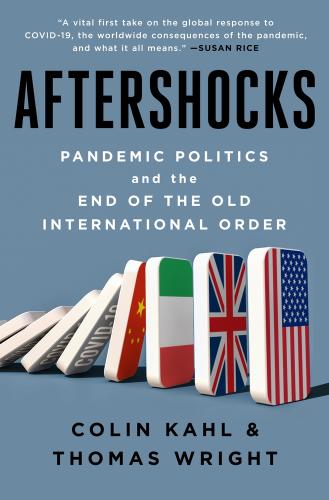
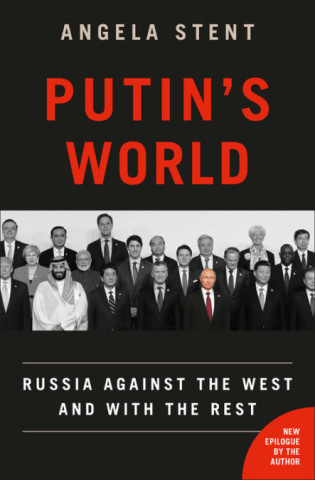
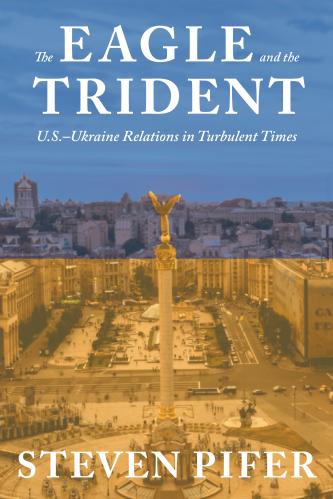
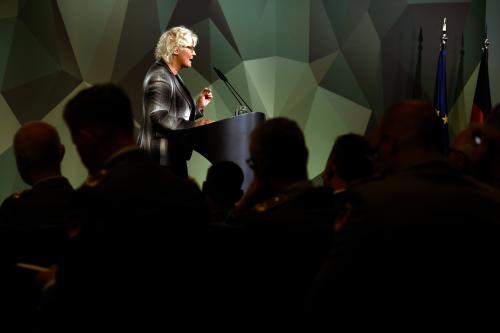
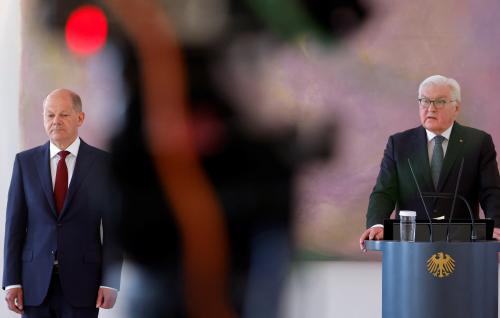


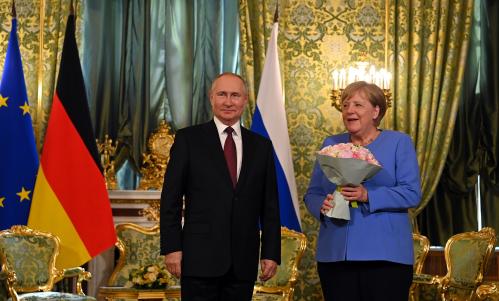
Commentary
The free world and its enemies: What Putin’s war and China’s global ambitions mean for us
November 4, 2022